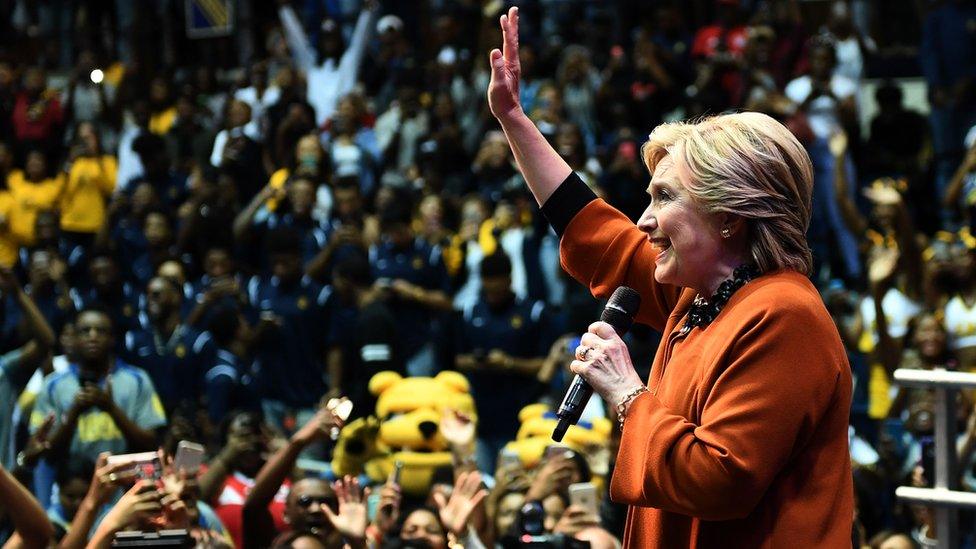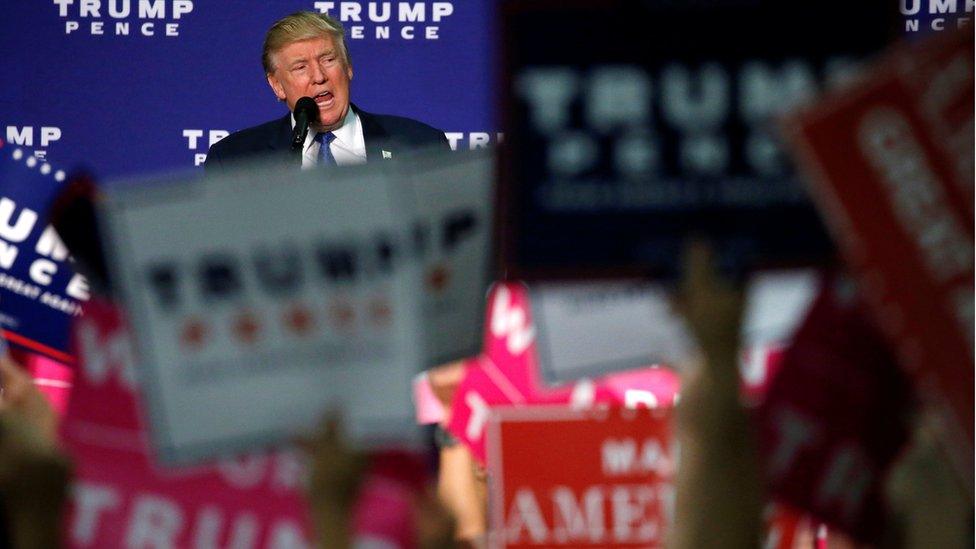US election: The state that defines the American divide
- Published
US Election 2016: Presiding over a divided flock
Derwin Gray won't say which way he is voting.
The charismatic, former NFL-playing pastor of Transformation Church doesn't want to upset the carefully choreographed racial balance of his evangelical congregation in Charlotte, North Carolina.
But as an African-American man, he sympathises with black voters who feel this election is really about race and class.
Two years ago Pastor Gray was pulled over on the highway by the police. He told me he'd done nothing wrong. The policeman, the pastor recalls, asked him brusquely: "What are you doing here?"
For Mr Gray that innocent-sounding question tipped him into a rage. He was a grown man, paying taxes towards the police officer's salary, driving on a highway also paid for with tax dollars, and driving home from preaching the gospel - he had as much right to be there as anyone.
But Mr Gray knew rage and indignation were not options. He told his 13-year-old son to put his hands up on the seat in front of him and answer the officer politely: "Yes sir, no sir."
Mr Gray adopted the same attitude. "I didn't say what was in my heart," he told me. "I said what I needed to get us home."
US Election 2016: Presiding over a divided flock

Can Clinton turn North Carolina back to blue?
The indignity of that choice still smarts, for Mr Grey and for many African Americans. It's such a common experience that the phrase "driving while black" has entered American lexicon.
Mr Gray's story is a reminder of why race is such an important part of this election campaign and particularly so here in North Carolina.
When Charlotte, the state's booming financial centre, exploded in riots in September after a black man was killed by police, many African-Americans said the event simply exposed an existing reality.
Black voters still feel the Republican party just doesn't address their concerns over discrimination. In North Carolina, as elsewhere, these voters are overwhelmingly Democratic.
But ethnic and class lines are blurring here. This is a state that is changing fast.
It's seen an influx of newcomers. There has been a rapid rise in the Hispanic population, but a lot of well-educated whites from the Midwest have also moved here seeking jobs in the thriving urban centres of Raleigh-Durham and Charlotte.

Trump campaigns in the state as early voting began in North Carolina
Many of them lean Democrat.
But poor white voters tip North Carolina's rural areas towards Donald Trump.
These are people who used to work in textile mills that have now shifted jobs to Vietnam and Bangladesh.
Donald Trump promises to make American manufacturing great again and even if rural voters don't quite believe him they think he is more intent on trying than the established politician, Hillary Clinton.
As Sherry Chisenhall, the editor of the Charlotte Observer explained to me, it is a remarkable feature of this campaign that a white Manhattan billionaire can appeal to someone from a deeply rural area of a southern state and somehow make them feel "he gets me, he understand my struggle".
North Carolina is America's newest purple state.
It voted Republican in 2004, Democratic in 2008 and Republican again in 2012.
Donald Trump hopes it will swing red this year because it's almost impossible for him to win the White House if he doesn't win North Carolina.

The US election explained
How did we end up with two such unpopular candidates?

